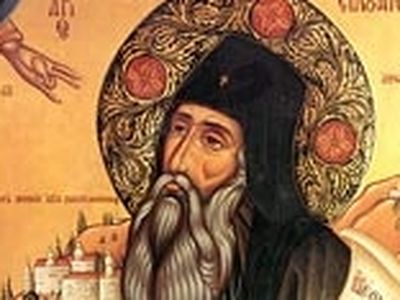Everyone in life has his own battle of Stalingrad, his own cross, his own Golgotha. There are moments when it seems that circumstances are indeed beyond our power, when life breaks down and it’s painful even to look at the world around us. In such moments the soul is tormented by one question: “Why?” Reason refuses to accept reality and it languishes in bewilderment and supposition, tearing the wounded heart into pieces. Reality is cruel, and the soul can truly become sick. And no one knows when sorrows will knock at doors of the heart. But we must know in that moment how to answer these unawaited guests…
“The Merciful Lord loves His own servants and gives them sorrows on earth, so that the soul would through sorrows learn humility and dedication to God’s will and find peace in the pain, as the Lord said: Learn from Me, for I am meek and lowly of heart, and you will find rest unto your souls.” This is what St. Silouan of Mt. Athos wrote in one of his letters—and he was a saint who truly knew by his own experience the color of pain. The demons so tormented him as a young novice with attacks both obvious and obscured, that he at last fell into the depths of despair and thought it impossible to beseech mercy from God. With that thought, with his whole heart he suffered complete abandonment, and his soul sank into the darkness of hellish anguish and melancholy. Nevertheless, he withstood it all; he clung to the brim of the abyss without taking that fatal step toward eternal destruction. How he clambered any way he could out of the abyss of despair we learn from another of his letters: “I have many sorrows of my own. They are my own fault, because I did not learn Christ-like humility…” There is very much hidden in this seemingly simple confession. And the most important thing here is that, despite all the horrors and suffering God allowed the saint to experience, he was able by his life to justify God’s Love and Mercy. Here is the meaning of a Christian’s suffering! It is in not only not breaking down, in getting through it and enduring to the end—but in never ceasing to have faith in God’s love for mankind even when one is in utter agony.
The Lord has entrusted much to us—He entrusted to us the truth about Himself! It is truth, which this cruel, unjust, and self-willed tyrannical world has forgotten. We are called here, amidst suffering and lies, to justify the Creator’s goodness! The Savior has entrusted to us the testimony of His measureless mercy for mankind, about how He was crucified, endured cruel torments and scourging—proving that He has not abandoned us, has not alienated His fallen creation, but rather with the entire depth of His boundless love desires our salvation. This means that in the eyes of the all-good Creator, those sorrows and sufferings that come into our lives have beyond all doubt some good meaning; and that means that we must also come to know them as a testimony to His mercy. And we must not only come to know them, but also accept them with all our hearts, and submit ourselves to the Creator’s Providence, even though we may not fully understand what it is.
“You see, it is easy for us Christians to live in the world,” testified the much-suffering Fr. Silouan. “It is good and pleasant for our souls. We have become accustomed to humbling our souls, and for this the merciful Lord gives us His grace. It teaches us to love God with all our souls and to love our neighbor as ourselves. This is our life in God, and the enemies envy us and want for us to forget God. But we, supported by God’s grace, love God and find peace in Him.” Having experienced the abyss of despair, ceaselessly worn out by sicknesses and other sorrows, St. Silhouan calls us to one thing: “Let us keep in our thoughts day and night that the Lord loves us sinners and calls us to Himself.”
“Glory be to the merciful Lord, that He loves us so much and gives us His grace. It teaches us to know the Lord and helps us to keep the holy commandments. In them the soul obtains rest in God. Our joy, our merciful Lord loves sinners and gives them His grace of the Holy Spirit. He is sweet, He cannot be compared to anything on earth; see—this is what the Lord has bestowed upon us in His mercy,” as St. Silouan testified from the depths of his heart. This means that when sorrows visit us, the Lord Himself is nigh. It means that God has once more entrusted to us what he cannot entrust to others; what those who do not know Him, who have only heard of Him, cannot understand. God entrusts the witness of Him only to His closest friends. Therefore we also should be ready for the time when the Lord will accept us as worthy to bring the news of our God’s love and mercy to the lost and despairing world. And then, wiping the tears from our faces, we must go out to people and witness that we are beloved of God, despite all the difficulties and temporary hardships—even tragic and irreparable ones—we still believe that our God wishes us only good, and orders everything for the salvation of our souls!
And in the most difficult moments of our lives, we will not depart from faith in the good Providence of God, in God’s measureless mercy and love for us sinners. Then the Lord will not depart from us; He will not forget those who faithfully bore witness of Him to the lost world! In the heaviest moments of our lives, God is entrusting to us what is most sacred—the truth about Him! This means that He believes in us, loves us, and wants to make us His own. Therefore, even in sad circumstances, amidst pain and suffering, let us not forget that we are beloved of God, and, “Let us strive to conquer ourselves in deed, so that the soul would come to know God. It is a great joy to know God. The soul desires Him insatiably. Great is God’s mercy for sinful man. The Lord allows us to gain knowledge of Him, of how merciful He is, and how much He loves us. This love is known from the Holy Spirit. See—this is how the Holy Spirit lives in our Orthodox Church.”




